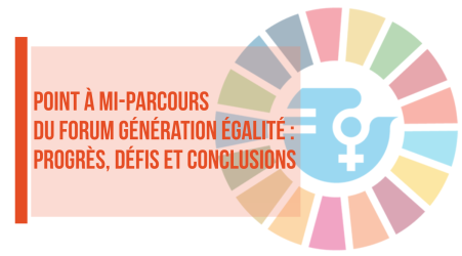On September 17, during the 79th session of the United Nations General Assembly, the Generation Equality Forum [1] presented its third annual report to its civil society partners. Nearly twenty-five years after the adoption of the Beijing Declaration[2], this report assesses the progress made toward the declaration’s goals and underscores the need to intensify efforts beyond the 2026 deadline.
“The work accomplished within the framework of the Generation Equality Forum extends beyond the 2026 deadline. It is, in fact, an accelerator for the 2030 agendas.”
Beyond short-term objectives, the Forum also aims to drive sustainable actions aligned with the United Nations’ 2030 Agenda, particularly with Sustainable Development Goal (SDG) 5, which seeks to promote gender equality and empower women and girls. This crucial issue resonates with the historic commitments made during the 1995 Beijing Conference, which, twenty-five years later, remain as relevant as ever.

©the Generation Equality Forum
From the Beijing Declaration to the Generation Equality Forum: Progress and Challenges
Under the Beijing Declaration, a roadmap was established to ensure women’s rights and their full participation at all societal levels. Key commitments included combating violence against women, ensuring access to education and health, and promoting women’s participation in decision-making processes.
Today, significant progress has been made thanks to international action drivers like the Generation Equality Forum:
These commitments have had a substantial impact on improving the lives of women and girls, as reflected in numerous testimonials. They also enable civil society to strengthen its structure and align its actions around common objectives:
In 2023, 1,926 new or strengthened policies were implemented, followed by 4,448 new programs and 5,739 advocacy initiatives. Additionally, at least $1.5 billion was invested to promote women’s participation in peace processes, economic security, leadership roles, and protection. However, challenges remain, prompting the Forum to make the following recommendations:
Perspectives and Contributions of the RAJA-Danièle Marcovici Foundation
The Generation Equality Forum report also highlights the critical role of its partnerships, such as with the RAJA-Danièle Marcovici Foundation. For several years, the foundation has actively supported projects that promote gender equality and combat social inequalities. More than 90% of the initiatives supported by the foundation align with the Generation Equality Forum’s goals, thereby reinforcing the impact of both local and international actions.
In 2023, the RAJA-Danièle Marcovici Foundation supported 140 projects focused on the themes of “combating violence against women and girls,” “empowerment, education, and leadership for women,” “women’s economic rights and employment,” and “women’s environmental actions.” Within these four themes, the foundation continues its commitment through advocacy efforts, particularly in favor of gender equality.
The foundation partners with various public and private entities and is committed to the “Climate Justice” action coalition established during the first edition of the Generation Equality Forum in 2021. Following the “Climate Justice” coalition created in 2015 after COP21, the action coalitions are major deliverables of the Generation Equality Forum, reaffirming climate justice commitments made in 2015 by emphasizing the links between gender equality and climate change. Through this coalition, the RAJA-Danièle Marcovici Foundation has pledged €1.5 million over five years to feminist climate justice actions, with €1.3 million already dedicated.
[1] The largest global feminist gathering in over 25 years since the last UN World Conference on Women (held in Beijing in 1995). It brings together organizations from all sectors of society to catalyze progress for gender equality and to ensure that the objectives of the 1995 Beijing Platform for Action on women’s rights are implemented.
[2] A set of principles on gender equality adopted by the UN at the conclusion of the Fourth World Conference on Women in 1995.